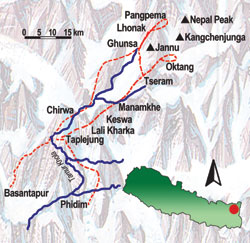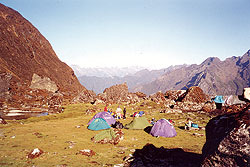 Behind closed doors we sipped our dusty bottles of Pepsi in the village of Chiruwa, away from prying eyes on the street and Maoists who might be lurking in the shadows, ready to pounce on hot, thirsty, hapless trekkers, or more likely, take retribution retaliate against the hotel owner.
Behind closed doors we sipped our dusty bottles of Pepsi in the village of Chiruwa, away from prying eyes on the street and Maoists who might be lurking in the shadows, ready to pounce on hot, thirsty, hapless trekkers, or more likely, take retribution retaliate against the hotel owner. This is in no way intended to take away from the seriousness of the atrocities and violence that have beset this country over the last few days. It is an example to illustrate that tourists are not unaffected anymore in the sparsely-trekked Kangchenjunga region.
Undertaking a 40-day exploratory trek in the region with three other tourists, two western guides and a crew of about 16 produced plenty of evidence that despite reassurances that tourists are not Maoist targets, this may no longer necessarily be the case. I have literally just finished washing my trekking clothes, so the examples I highlight are current and relevant, though I hasten to add that in none of the incidents I was told about or experienced was there evidence of violence or coercion.
We arrived in the area in mid-October to the news that, for the most part, the places we would be visiting were "dry". What beer we did manage to find had to be drunk behind curtains or closed doors, certainly never in front of a window looking onto the street.
From Taplejung up into the trekking area police have abandoned their posts and their buildings are boarded up. The airfield at Suketar, into which many trekkers fly, is visited by policemen when flights are expected, but they always sleep in Taplejung. During the early part of the trek there was news of several incidents of people being stopped by Maoists on the south side route of Kangchenjunga in particular. One sirdar who had been asked for money allegedly offered a day's wages. The Maoists were after something on the order of Rs 10,000 although it is unclear how this situation was resolved. Subsequently we decided that our sirdar would not carry a large amount of cash.
 Our group witnessed a training camp in Mamangkhe on the south side, with several participants checking the loads and conditions of our porters. The following day while camped in Lali Kharka, our sirdar spent an hour conducting delicate negotiations with a group of Maoists asking for cash donations, binoculars and cameras. He politely refused them.
Our group witnessed a training camp in Mamangkhe on the south side, with several participants checking the loads and conditions of our porters. The following day while camped in Lali Kharka, our sirdar spent an hour conducting delicate negotiations with a group of Maoists asking for cash donations, binoculars and cameras. He politely refused them. They claimed these were tools that would help in their training and surveillance work. About two weeks ago a group of English trekkers was stopped in the Makalu Barun National Park by Maoists with guns, asking for the same things. In this case also the sirdar negotiated his way out of the situation.
None of the trekkers I spoke to on the trail expressed fear or apprehension about being in the area, but it will be interesting to see to what happens next, to what extent the Maobadi will affect Kangchenjunga's fledgling tourism industry.
Wanda Vivequin is a New Zealand journalist who has just finished a 40-day trek in the Kangchenjunga region.


